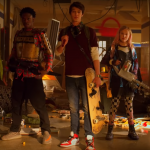The Problem With Netflix’s Death Note

For those of you who know the plot and characters in the well-known anime Death Note, which started in 2006 and ended in 2007, you’ll know it’s a story set in Japan with the majority of characters being Japanese. So, it would make no sense to cast white actors to play these characters in a live action movie, right? Well, Netflix doesn’t seem to think so.
The cast for this Western version of Death Note includes Nat Wolff, Willem Dafoe, Margaret Qualley, and Lakeith Stanfield. If you know who these actors are or even do a quick Google search, you will know that not one of these actors are Japanese. True, there are a few characters who aren’t Japanese, such as American FBI agents and the private investigators like L, who were born and raised in England. And yes, Lakeith Stanfield, who is set to play L, is a black man, but that doesn’t really make the blatant whitewashing of Asian characters any better. Yet for some bizarre reason that I fail to understand, Netflix cast characters that were originally white in the anime as people of color while completely robbing Japanese actors of the opportunity to act in this film.
To make things worse, the characters’ names have been changed to make it fully Western. Light Yagami, who will be played by Nat Wolff, is now Light Turner; Misa Amane (Margaret Qualley) is now Mia Sutton. The only characters whose names have stayed the same are Ryuk, L, and Watari, and I dread to think of what they’ll end up calling Shinigami. Not to mention, the name given to Light by the people of Japan is ‘Kira’ which is Japanese for ‘killer’; I wonder how or if they’ll even explain that.
To top it all off, there is literally a new live-action Death Note film that came out last year in Japan, with a full Japanese cast, called Light Up the New World. This movie is set 10 years after the events of the second Death Note movie they created — The Last Name — and features amazing actors such as Masaki Suda, Sōsuke Ikematsu, and Masahiro Higashide. Of course, it’s yet to be released in the West as it was only released in Japan on the tail end of 2016, but if you’re eager for more Death Note content (that isn’t whitewashed) I urge you to check out Death Note: New Generation. New Generation is a three episode mini-series to introduce the three new main characters in Light Up the New World; each episode is 20 minutes and they are all brilliantly made.
In any case, I urge all of you to watch the original Japanese Live Action Death Note movies rather than watching some watered-down Western version and, if you don’t enjoy them as much as I have, please just stick to the anime. Asian actors are being robbed left and right by Hollywood making live-action anime films and only casting white actors. Just look at Ghost in the Shell. Don’t let them make money off of it.
Author: Samandriel Pajon
Help support independent journalism. Subscribe to our Patreon.
Copyright © The Geekiary
Do not copy our content in whole to other websites. If you are reading this anywhere besides TheGeekiary.com, it has been stolen.Read our







Kira isn’t japanese for killer, it’s what it sounds like when a Japanese person says killer. They said that in the anime.
Logan, you obviously weren’t paying attention to the show because kira does infact mean killer in Japanese. It’s also likely that the version you had watched was poorly subbed/dubbed. Translation can sometimes be tricky but the author is correct in stating it.
Kirā does not mean “killer” in Japanese the way you think it does. It does not have the same connotation. If you are using it to mean murderer, then it IS Japanized English. No one in Japan actually uses it to refer to murderers.
If you say Kirā in a courtroom, you will be laughed out of the room or looked at with a quizzical expression.
Japanese words for Killer:
殺人者 satsujinsha — someone who killed a person/people
殺し屋 koroshiya — someone whose job is to kill
This is an American remake and a reimagining from what I can tell. If they made this movie in Mexico with Mexican actors, nobody would be complaining. Mexico has a Breaking Bad remake, we’re they brownwashing? Kids with cancer, global warming, poverty, disease, and the government can read our emails as we type them without a warrant and you spend your time drawing focus away from things like that with stories calling people racist for making an American version of something and casting American actors.
This is an entertainment website. Entertainment doesn’t stop because politics have gotten overwhelming. We are still going to do all the things we were doing before, and for many of us being able to call out the consistent white washing and other social issues are even more important to us now. Trying to say we shouldn’t discuss them because it “draws focus away from kids with cancer, global warming, poverty, disease, and the government” is an extremely dangerous and harmful rhetoric. And worse, it’s extremely disingenuous. If entertainment and the resulting commentary is a distraction, why are you spending your time here reading about it? Go fight for your causes instead of sitting here and telling us not to fight for ours.
For the record, many people on this website fight in other battlefields outside the entertainment industry as well. But as I said, this is an entertainment website. Covering non-entertainment news is outside of the scope of what we do here.
Please view my article here for a statement on how The Geekiary will be approaching the current political climate moving forward: https://thegeekiary.com/progressive-geeks-work/39232
Seeing as how the film rights were purchased by a Western company in order to make a film that appeals to a Western audience, I feel that using the term “whitewashing” in this instance is intellectually dishonest. Was Japan “yellow-washing” when it cast Japanese actors for its Attack on Titan film adaptation? The commenter also pointed out the Mexican remake of Breaking Bad and you ignored him/her.
The story of Netflix’s Death Note does not take place in Japan and it does not feature white actors playing Japanese characters. Everything has been re-written so that the movie takes place in Seattle, and therefore the casting is largely American.
If you don’t take issue with the Attack on Titan Japanese adaptation, the Breaking Bad remake, The Departed or any other instance of East-to-West/West-to-East remakes, you’re either a hypocrite or too inconsistent to be taken seriously as a pop culture commentator.
I suppose I’ll have to go with the inconsistent option, since you are forcing me to choose here. I’m inconsistent because I’d rather stand up for more POC representation in all media, even at the expense of white representation. I view us as an overly represented race on a global scale, and I’d prefer the world has more POC characters *especially* in countries predominately dominated by white people. I am not bothered by countries taking media with white characters and converting them to POC characters, because that assists with my goal of adding more POC representation across the board.
I should, however, be taken seriously. I am not thousands of dollars in debt over a media degree for nothing here.
The reason you seem to think whites are overly represented may be as a result of living in a bubble. Have you, by any chance, heard of the Indian or Chinese film industries?They’re kinda massive.
Further to the point, the idea that you would take issue with a studio in a majority white nation casting whites is puzzling, if not outright troubling.
Would you tolerate the film’s existence if the ENTIRE CAST was ASIAN, despite the movie continuing to take place in America and thus resulting in an obvious lack of realism? Would you have preferred that the production moved to Japan entirely?
Would you prefer it if there were no white actors in the production whatsoever and the cast was made up of Hispanics, blacks and other minorities? I’m attempting to understand your thought process here as I don’t seem to understand what sort of solution you are offering.
@Jim …You’re conflating ‘white’ with ‘American’.
It’s not a white remake, it’s an American remake. L is black.
I love Death Note, but to be honest the Japanese live action films don’t do the manga or the anime any justice. I don’t know how the American version will be but I don’t see anything wrong with creating an American version. This has been done so many times with Japanese movies, mostly horror films, such as The Ring, One Missed Call, The Grudge, Shutter, and the list goes on. Not to mention the upcoming Ghost In Shell movie which features Scarlet Johansson, an American, playing the lead role.
Movies are meant to be relatable in many cases and one way that this can be done is by creating region specific versions. There is nothing wrong with the original versions, but it is always interesting to explore the contrasts within all the different versions available. I do not have super high hopes for the Netflix movie, but I am definitely excited for it and can support it for what it is.